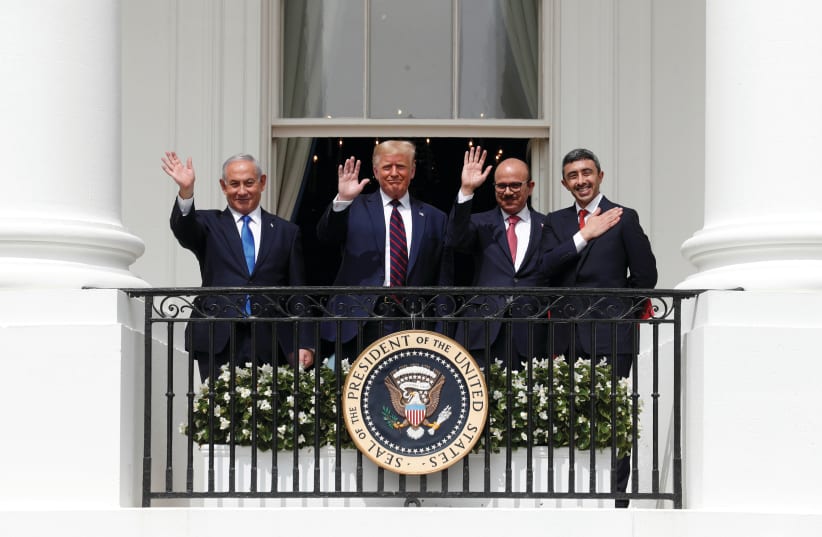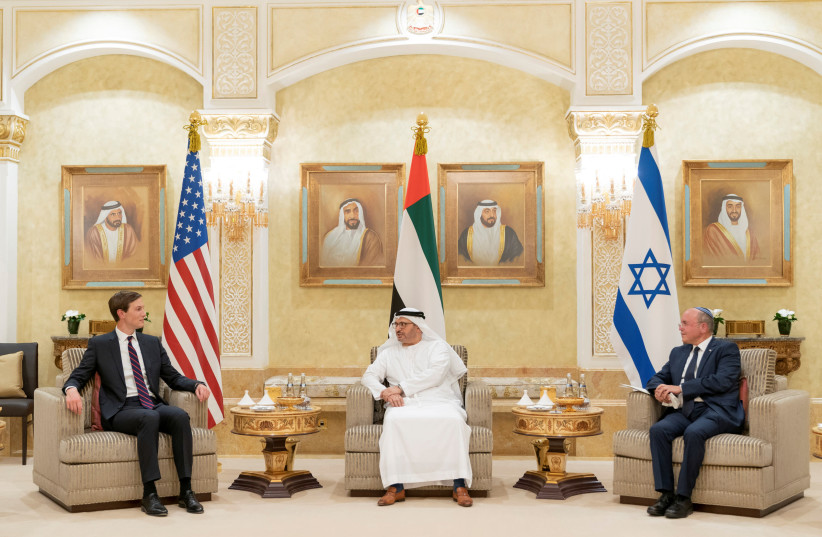We are currently witnessing the second anniversary of the Abraham Accords between the UAE and Israel in 2020, when peace became a strategic reality between the two countries in all fields: political, economic, trade, security and investment.
Immediately after the normalization of relations in 2021, bilateral trade exchanges between the UAE and Israel reached a remarkable level of around $1.2 billion. Over the next five years, this exchange is expected to reach around $10b.
We are witnessing an actual state of peace, not just protocol agreements tucked away in desk drawers.
This in itself is a great achievement of the agreement that has brought peace out of closed offices and into a formal and universal sphere of human relations between the two sides. The two-year anniversary of this strategic agreement provides an opportunity to assess its results. In this context, it can be said that the agreement, unlike its predecessors, has achieved several results.
The first is the creation of a more stable environment in the region.
A culture of peace has been established and spread throughout the region, it has become a common concept and has taken precedence over other terms such as “war,” “enemy” and other vocabulary that for years and decades were indicators of the underlying conflict situation that extremist and terrorist organizations tried to inflame and exploit, whether in light of the confrontation between Palestinians and Israel or in any other occasion.
Helping the UAE build stronger ties
The second outcome is the UAE’s success in building a strong and balanced relationship with all parties in the Middle East. Following the formal normalization of relations with Israel, Emirati diplomacy was able to continue its policy of building bridges by focusing on realistic interests and formally renewing relations with Iran with the recent return of the Emirati ambassador to Tehran.
Prior to that, there was a course correction in Emirati-Turkish relations that settled the dispute and launched a new phase of joint cooperation. This reflects the UAE’s desire to create a secure and stable regional environment that provides the necessary conditions for achieving the UAE’s development goals to maximize the strategic benefits for its regional and international network.
The UAE proves that its talk of common ground and a stable regional security environment was not a political maneuver, but rather an expression of careful strategic planning to realize the interests of the UAE and its people, without engaging in alliances or axes that distract the realization of these interests from their ultimate goal.
Historic breakthrough for Israel
The third of these outcomes concerns the Israeli side, which achieved a new historic breakthrough from its regional insulation with the Abraham Accords. The agreement paved the way for communication and openness between Israel and other Gulf and Arab countries. It was the cornerstone that prompted other capitals to take a peaceful step with Israel.
This in turn opened the door to a new phase of regional cooperation in trade, economy, tourism and so on. We see a further expansion of Israeli cooperation with neighboring Gulf states, which bodes well for a cooperative and stable regional climate. The fourth of these conclusions relates to a strategic analysis of the Abraham Accords as a whole.
The agreement reflects the status, effectiveness and ability of UAE diplomacy to take the lead and influence its regional environment in accordance with an objective and calm approach that is consistent with the UAE’s foreign policy characteristics since the establishment of the union state.
In this agreement, the UAE emphasized its role in promoting direct and indirect communication between regional parties, preventing the outbreak of sudden regional crises or the expansion of violent clashes between Palestinians and Israel, and reducing the influence of organizations and groups supported by regional parties that foment hostility toward Israel.
Creating a framework for a regional order
The fifth of these outcomes is the creation of a framework for a regional order capable of dealing with crises and threats, in which the US, which continues to speak publicly about the importance of the Middle East in US strategies, no longer plays or could play a role.
Practice on the ground indicates that US interest in maintaining security in the region and in maintaining traditional alliances and partnerships with countries that have formed strategic alliances with the US has diminished significantly.
Expanding Emirati diplomacy
The sixth consequence of the Abraham agreement is that Emirati diplomacy will continue to expand its cooperation with various regional parties, especially Iran and Israel, within the framework of a flexible diplomatic approach that focuses on development, economic and trade interests, without falling into the cycle of polarization and tensions that affect international relations at the current stage.
The gradual acceptance of peace in the Middle East
The seventh of these results is the gradual acceptance of the culture of peace among the population and the cooling of the conflict situation and the atmosphere of violence between the Palestinians and Israel. Despite the clashes between Hamas and the IDF last year and another clash between Islamic Jihad and Israel recently, violence is decreasing, albeit slowly.
It should be noted, however, that Palestinian support for escalation with Israel, particularly in Gaza, is not as great as in earlier periods, and that there is a relative tone of calm and stability. This is favored by Israel’s incentive policy, which encourages the Palestinians to maintain an atmosphere of calm.
These are all important indicators that need enough time to turn into real steps that will advance the building of a lasting peace between Israel and the Palestinian people. All this is one of the goals of the Abraham Accords and its positive results in this short time.
The writer is a UAE political analyst and former Federal National Council candidate.

